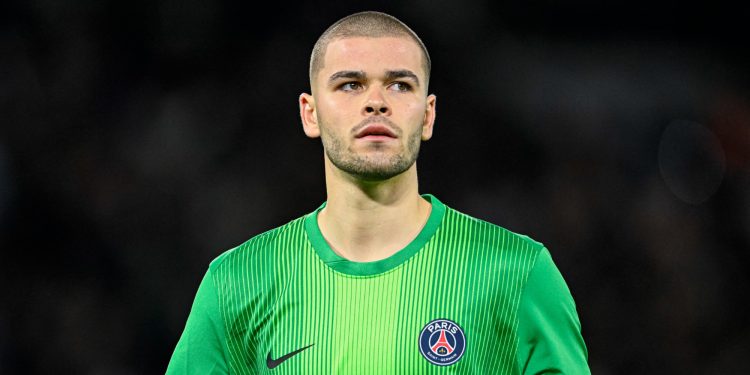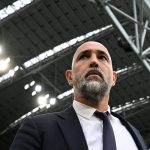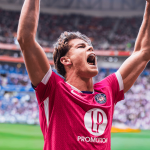If taking on the role of PSG goalkeeper is, by definition, no easy task, doing so as the successor to European champion Gianluigi Donnarumma makes it even more challenging. Yet this is the new reality for Lucas Chevalier.
After becoming the third most expensive goalkeeper of all time last summer, the 23-year-old has entered a whole new dimension. And he has already seen what that entails.
Because playing for a club of this caliber is all about accepting that nothing goes unnoticed. But that’s nothing to scare the Calais native, whose personality and maturity are often praised.
A strength of character that, in the space of a few years, has enabled him to progress rapidly, from Ligue 2, where he was loaned to Valenciennes for the 2021-22 season, to the French national team, where he is now Mike Maignan’s back-up. A goalkeeper he played alongside at Lille, from whom he learned a great deal and whose mantle he has now taken up after neither Leo Jardim nor Ivo Grbic managed to impress between the posts at LOSC.
Clearly, Chevalier didn’t wait until his transfer to PSG to realize what it meant to succeed a great goalkeeper.
What he did realize, however, was that every move he made and every word he spoke would now be scrutinized, analyzed, and interpreted. His mistakes too. His mistakes especially, one might even be tempted to say. Much more so than when he was at Lille, in any case. Chevalier quickly witnessed this for himself. Perhaps even more quickly than he could have imagined.
For while history will only remember his heroic penalty shootout, marked by a save to deny Micky van de Ven’s attempt and give PSG the first European Super Cup in their history, seasoned observers will also recall his error that led to Tottenham Hotspur’s second goal.
They will also remember his failed aerial clearance that allowed Nayef Aguerd to score the only goal in a Classique snatched by OM at a time when, 800 kilometers away, Ousmane Dembele was crowned Ballon d’Or for the first time in his career. As one event naturally overshadowed the other, this certainly helped to soften the criticism directed at him.
In Barcelona on Wednesday, in Paris’ third big clash of the early season, Chevalier was eagerly awaited. On the one hand, by those he had not yet fully convinced, and on the other, by Luis Enrique who, despite his unwavering support, has already shown that he is not afraid to shake up his hierarchy.
Matvey Safonov, who notably replaced Donnarumma in goal for PSG at Bayern Munich in November 2024, is well placed to testify to this. Especially since the shadow of the Russian goalkeeper looms large over his French teammate.
“I don’t have any long-term plans. For now, my biggest concern is playing time. I’m focusing all my efforts on achieving that,” he recently explained in a Q&A session on his Instagram account.

And although he didn’t prove to be unbeatable, showing some hesitation at times, Chevalier still held his own against the Blaugranas. Above all, he reminded everyone, through his role in Paris’s build-up play (he touched the ball once more than Fabian Ruiz and only twice less than Warren Zaire-Emery), why PSG made the decision to sign him.
“He (Luis Enrique) wants to use me in the game, as a real 11th player, managing the space between my teammates and me, managing the depth,” he explained to beIN Sports. “I always try to be in contact, to be available and to ensure continuity in the ball’s movement. It’s a role I’ll have throughout the season.”
And that he is integrating a little more every day. Much to the delight of Enrique, who never misses an opportunity to praise his young player. But beyond his footwork, Chevalier also stands out for his numbers, which are quite interesting. Since the start of the season, his performances have helped PSG keep five clean sheets and win eight of their first nine games.
This Sunday, facing Lille on his native soil, Chevalier will have the opportunity to add another one to his tally. And he has no intention of letting himself be overwhelmed by the emotions that a return home might provoke. That’s not in the Frenchman’s nature, whose gaze is always turned toward the future, without ever denying what has happened in the past.





